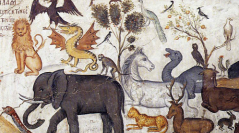

 Anthropozoologica
55 (14) - Pages 199-218
Anthropozoologica
55 (14) - Pages 199-218What is the use of modern taxonomy when dealing with non scientific classifications? And what do we learn in turn from the use and function of these classifications in context? Modern taxonomy is regarded as providing a systematic and effective classification framework for identifying and inventorying species and rationally structuring the animal world. As baseline model, it would offer a robust benchmark for social science and humanities researchers to assess the relevance and accuracy of popular ways of classifying or other cultural classifications. We wish to criticize this mirage, by showing the epistemological difficulties and the abstract and artificial formalism of modern classifications. We consider successively the basis and use of classification, the methodological function of classes, and then the ontological status of the concept of species, starting from the Aristotelian framework that will allow us to look at the contemporary situation and put into perspective the modern productions. By insisting on the plasticity of ancient Greek classifications and the epistemological function that motivates them, as well as on the inadequacies of contemporary scholarly taxonomy, we show how various surveys of ethnoscience and cognitive psychology encourage us to revise, both for specific studies of ancient societies and for contemporary societies, this classification fetish.
Classifications, zoology, Aristotle, ethnobiology, prototype, species.